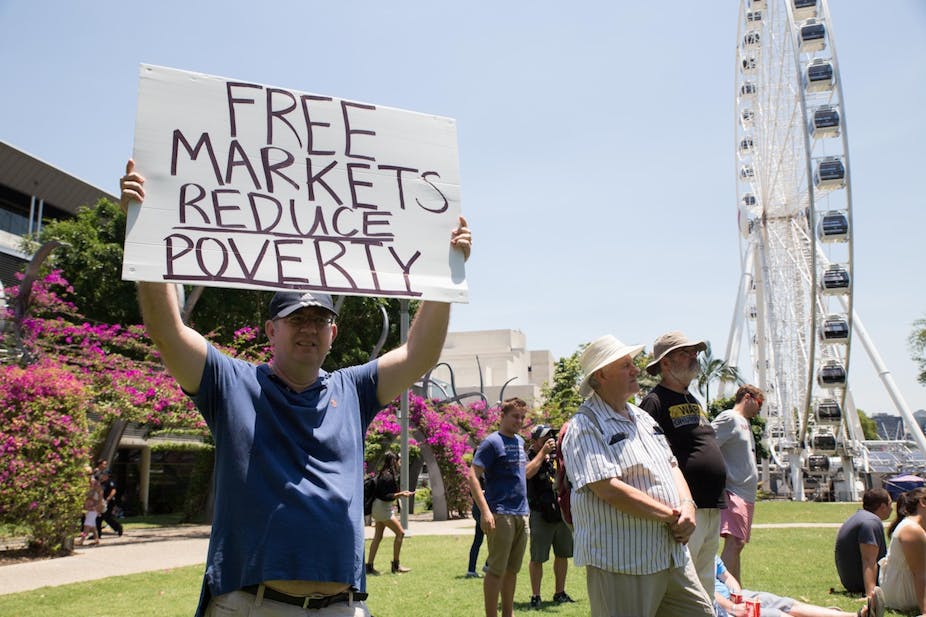Following a fortnight of intense Australian international engagement in APEC and the G20, last week saw the culmination of nearly a decade’s worth of negotiations with China over a much-anticipated free trade agreement. Whispers now abound of one with India close on the horizon.
The agreements, (along with recently-concluded ones with Japan and South Korea) were a testament to tireless bilateral negotiation by successive Australian governments, and will do much to open certain sectors for freer trade.
But for all the excited expectation of future gains, it is critical we appreciate what the case for free trade actually promises.
Even granting its many well-acknowledged assumptions, we must take care not to oversell the case for free trade – in no small part because to do so will leave us ill-prepared to consider the kind of economy we want, and whether simply “more market” is the right way to get it.
Free trade all the way
Free trade has been the mainstay of Australian economic policy - even after the 2008 financial crisis. (“Australian mercantilism” was how former Australian Treasury Secretary Ken Henry controversially described it.)
Whereas the murky world of finance plunged the world into economic disarray, free trade is seen as the way out of the mess; the market’s invisible hand trusted to guide economic activity towards greater efficiency and welfare.
Free trade has such prestige because the economic case for it is incredibly powerful. Since 1817, an almost unassailable argument for free trade has been built around a central tenet of David Ricardo’s principle of comparative advantage.
Ricardo’s insight: under free trade countries will specialise in goods they can produce relatively less inefficiently than others, and trade to acquire goods they are relatively more inefficient at producing – basically “outsourcing” the production of less efficiently produced goods.
What the case for free trade doesn’t promise
But let’s be clear about the gains that the case promises – and those it doesn’t. Comparative advantage envisages that free trade will deliver immediate consumption benefits – people get more goods – due to production being more efficiently located globally.
These gains are nothing to be sneezed at, though there are live questions concerning how real some of the numbers being thrown around actually are. But the list of things that the standard case does not focus on is somewhat longer – and not insignificant.
First, the case for free trade says nothing about dynamic gains over time – that is, economic growth and development. Economists since the late 1700s have understood that exposing newly-developing industries to international trade may well realise short-term gains, but might also lead to longer-term inefficiency if these industries are initially too fragile to survive the storms of global competition.
We must be careful and clear about the trade-offs we are willing to make about present and future economic gain.
Second, although advocates of unbridled free trade often hint that “everyone” wins through free trade, that isn’t necessarily what the case for it says.
In the post-trade wash up we might find that gains are concentrated in some hands rather than others. Medical service providers might do well, but auto factory workers might be out of jobs.
There will always be winners and losers. While trade gains might be shared across all, this is often unlikely unless separate action is taken – probably by government – to make sure the initial losers are compensated through gains that have been garnered by others.
Finally, even if free trade leads to immediate and well distributed gains, free trade might have other strategic effects beyond consumption. For example, certain patterns of trade can make a country more dependent on foreign imports relevant to security or the broader national importance - such as foreign energy, food or armaments.
Again, political decision-making is critical to ensuring that the desired balance is struck between short-term economic efficiency and broader geopolitical positioning.
The inevitability - and necessity - of political choice
Cheery advocacy for free trade often brushes over the unavoidable fact that in trade policy – as in so much else – little is costless; in order to create some opportunities, something must be foregone. Specialisation in one industry implies that others must languish. Pursuing some goals means others must be sacrificed. One person’s advantage is often to another’s detriment.
Overselling the case for free trade can mask these trade-offs – the case is powerful, but it does not purport to answer these questions. Overselling blithely throws to the market settlement of political decisions that it is ill-suited to making.
Free trade can sometimes be imagined as something of both a start and an end to the question of economic policy-setting in today’s global economy. But in truth it should be neither – it must be preceded by consideration of what kind of economy we want and which gains we seek through international trade, and followed by careful attention to how these gains are to be distributed across a population.
These are issues too important merely to be left to the vagaries of the market.

